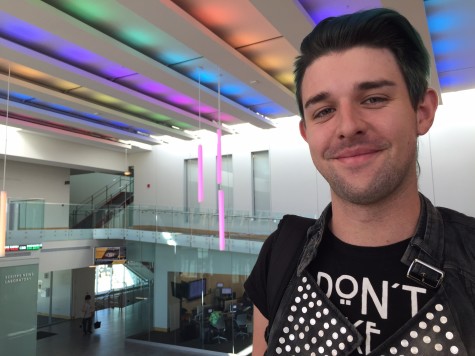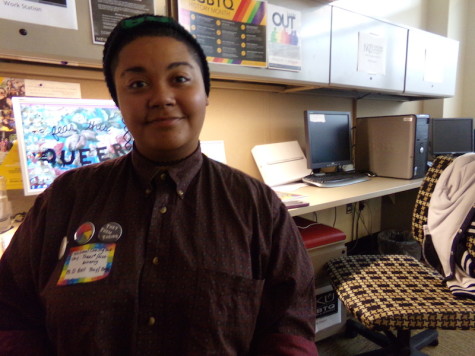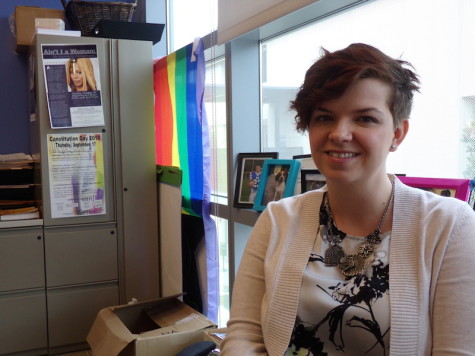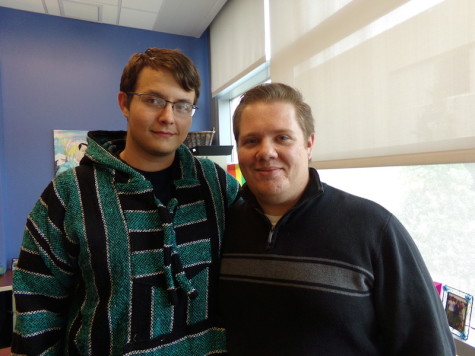Your donation will support the student journalists of Northern Kentucky University. Your contribution will allow us to purchase equipment and cover our annual website hosting costs.
Making room in society: Tales of coming out
October 24, 2015
Finding a place at the table in society may be bold, but setting your own plate is even bolder.
Acceptance has been an age-old struggle for many different groups. In a society typically resistant to change, the fight for acceptance can take a long time before results are ever seen.
With October being LGBTQ Awareness month, the NKU community has brought to light many new issues and changes. In order to get a better idea of who is affected by these changes and issues, NKU students and faculty have come forward with their own coming out experiences.
Josh Newman
Identifies as non-binary, gay
He/Him
“I remember being 4 or 5 [years old] and I knew there was something different about me,” senior BFA costume designer Josh Newman reflected. “I remember not being able to fit in, especially with the boys.”
Growing up in the conservative town of West Chester, Ohio, Newman found it hard to grasp the feelings he was experiencing at a young age. A non-denominational Christian and finding that it was difficult to express himself, it took him awhile to realize that he was gay.
“Around the age of 8 or so, my mom cornered me and said, ‘All right, what’s going on?’” Newman explained. “I didn’t even know. I was sheltered, I was homeschooled, I went to church… I didn’t even know what gay was.”
Newman eventually found his truth and came out to his mother.
“When I admitted I was attracted to other men, my mom was really, really upset about it,” he recalled. “There was a whole dramatic moment about it. My dad was a little less shocked because his brother was gay.”
His mother ran out of the room crying after learning her son was gay.
Newman’s family then proceeded to try to “fix the problem” by sending him to conversion therapy meant to “treat his condition.”
“In a way I did come out, but it was like so much more shameful that it needed to be,” Newman said. “So we tried the whole trying to repair it thing which clearly didn’t work.I will say as a side note that when a lot of people hear that, they think the really intensive stuff which I didn’t have to go through. The stuff I went through was like normal therapy.”
Newman asked his therapist what the steps were for getting help, but he never provided a clear step for him to make. He would tell Newman to just try harder.
Newman noted that it was not a fun experience, but the struggle of having an anti-gay therapist wasn’t as intense for him as it can be for others.
Newman puts a lot of emphasis on finding yourself and “owning your truth” because he wasn’t able to do that growing up and coming out.
“All through junior high and high school I came out as struggling with homosexuality,” Newman said. “My mom called it SSA, same sex attraction. It was interesting because growing up, admitting to people that you were gay, but you had to be ashamed of it because I was in a very conservative community of people that weren’t accepting of that sort of thing.”
After Newman turned 18, his friends pushed for him to try a same-sex relationship and that’s when he began to feel more accepted and proud among his friends and community.
Newman recalls snuggling on the couch with his boyfriend at the time and thinking to himself, “Am I willing to go to hell for this?”
“I was like, ‘Yeah’ because… The connection we had, there wasn’t anything inherently different about it from other relationships I’ve seen,” Newman said. “It was a very romantic relationship… I don’t see anything wrong with this. This is… Maybe more normal than most straight relationships I’ve seen… This was something I was willing to fight for and something that I was proud of.”

Josh Newman identifies in the LGBTQ community. National Coming Out Day was Oct. 11 this year.
Morgan Bell
Identifies as non-binary, queer
They/Them/Theirs
“Queer for me means really social justice-y, like, breaking the binaries,” Morgan Bell, a senior integrative studies major, said. “Making people feel uncomfortable on purpose.”
Bell feels that they don’t fit in a specific box.
“It’s a term that was used as derogatory,” Bell said. “And now it’s kind of been taken back and it makes more sense to do that for myself.”
When Bell came out to their family, they were 12-years-old and came out as bisexual.
“This is how I found out that any of this was happening,” Bell said. “I was 5 [years old] and I was in love with my best friend in kindergarten and proceeded to kiss her, but the teacher never said anything to my parents which was interesting.”
During puberty, Bell wore all black so that they would look flat chested and started binding their breasts. A binder can be cloth, spandex or anything the can be used to compress breasts in order to appear flat chested.
However, their parents never knew about that because they would remove the bindings before returning home.
When Bell finally came out to their mom, they did it through a six-page letter, front and back. Bell slipped the letter into their mom’s purse and left for Chicago to spend time with their cousin..
“It did not go over well,” Bell said. “My mom called my dad and my dad called me and said, ‘We need to talk when you get back’ and I was like, ‘Holy crap.’”
Bell’s cousin told them to just enjoy their time there and not worry.
After returning home, Bell’s parents had a preacher come in and talk to them.
“It wasn’t like conversion therapy,” Bell said. “But it kind of was in our house.”
Being from a small town, Bell’s parents telling their preacher meant that the entire congregation quickly found out and Bell was outed to the town.
Bell’s father also held the belief that because Bell was identifying as bisexual that they would be willing to do more “men’s work” such as working on cars or chopping wood.
“I never wanted to do those things and he then had questions arise like, ‘If you’re this way then why aren’t you outside working with me?’” Bell said. “You know, how lesbians are always perceived to be, like, very butch.”
Bell disagreed and would stay in their room mostly until they were 18-years-old.
After coming to NKU, Bell came out as queer. A year later after the LGBTQ office opened, they took a job as the Student Programming & Research Assistant. Bell found it to be a safe haven here at NKU.
“My parents don’t really talk about it,” Bell said. “And I’m not open as trans to my parents.”
However Bell thinks that they can come out as trans because it doesn’t matter since their parents’ views won’t change and that doesn’t change who Bell is.
Being trans for Bell means that they dress differently by wearing more black or won’t be as touchy-feely with people.
“The rest of my family is completely supportive… My dad tells me he’s always gonna love me,” Bell said. “But there’s a certain level of love. If you love someone, you should love them 100 percent.”
Bell’s mom is now OK with their identity as a lesbian.
“My mom will always be my support,” Bell said.
Currently, Bell is looking for a counselor to possibly receive hormone replacement therapy (HRT).

Morgan Bell identifies in the LGBTQ community. National Coming Out Day was Oct. 11 this year.
Rae Loftis
Identities as queer
She/Her/Hers
“Identifying as queer has been a process,” Rae Loftis, coordinator for LGBTQ programs and services said. “When I first came out as non-straight or non-heterosexual, I identified as a lesbian.”
Loftis said that she began to realize that she identified more as queer when she found herself attracted to a woman, then a transgender person, followed by a cisgender man, meaning someone who identifies with the gender they have.
“So as that part has come out, I’ve sort of embodied what it means to identify as queer,” Loftis said.
When Loftis initially came out, she was in high school.
“I had my first crush and it was that die-hard, world-ending, everything stops kind of crush,” Loftis said. “At that time, I was like, ‘OK, this is a little bit different than my friends who were dating boys.’”
Loftis began having butterflies in her stomach and wouldn’t eat any of her favorite foods. Her mom was the first one to catch on.
“She had ordered breadsticks from this place that I always eat breadsticks and I wasn’t eating my breadsticks,” Loftis said. “And she was like, ‘OK, what’s his name?’ And I was like, ‘It’s a girl.’”
Her mom then explained that she was a lesbian and Loftis began to identify with that. It was easy for her to come out to her mom and her sister, but it took about six more months to come out to her grandparents, but the reaction was positive.
“I feel really fortunate,” Loftis said.
However, during college, Loftis experienced a negative reaction.
“I lived on a floor and I was picking and choosing who I came out to… I didn’t stop being who I was. There was one time that someone wrote ‘dyke’ on my door and it was really hurtful and nobody fessed up to who it was,” Loftis said.
After college, Loftis worked as a waitress in a small town in Texas. Men would ask for her number or asking if she was married, but she had a hard time coming out and saying who she was because she didn’t want to impact how much she would get tipped.
“I could not come out there as it was really small,” Loftis said. “So I made up a husband which was an odd decision and it was funny at the time… But it was also making up an entire life that doesn’t exist because I couldn’t come out.”
Rae Loftis now works as the coordinator for LGBTQ programs and services at NKU. Loftis hopes to further change, but also sees that acceptance at NKU.

Rae Loftis identifies in the LGBTQ community. National Coming Out Day was Oct. 11 this year.
Codi Kindoll
Identifies as gay
He/Him/His
“My coming out story is actually pretty good,” Codi Kindoll, senior psychology major, said. “I never thought it would be good. I feared my dad and what he would say.”
Kindoll always thought that he was gay throughout grade school and high school, but he didn’t come out until he was fighting with his mother and she began questioning why he was so secretive.
“I was like, ‘Because I’m gay!’” Kindoll said. “And I started crying and she’s like, ‘Honey, we always had our suspicions.’”
When telling his father, Kindoll had him sit across the room since he was afraid of what his father would say. After he came out to his father, he sat next to him and gave him a hug.
“He said, ‘Codi… You’re my son. I will always love you, you are my son. You are you’,” Kindoll recalled.
Kindoll felt safe in telling his friends and remained open about his identity. Outside of friends and family is where Kindoll experienced discrimination.
Before attending NKU, Kindoll had a degree in mortuary science and was working at a funeral home.
“Two days after I came out, they fired me,” Kindoll said. “And I haven’t been able to get back into the field since.”
According to Bonnie Meyer, director of LGBTQ programs and services at NKU, in Kentucky it is still legal to be fired for being gay.
“What’s been hard is to watch all my friends get their funeral director’s license,” Kindoll said. “And I would have been in that cohort getting my license.”
Kindoll found support at NKU in the LGTBQ office in order to tackle any discrimination even in the professional field.
“It’s really nice to be somewhere where there’s so much support,” Kindoll said. “No matter how you identify or where you’re from or who you are, it’s nice to be able to have some place to be able to go to and say this happened and they say, ‘OK, let’s talk about it,’ or, ‘We’ll handle it.’”
Daniel Hoffman
Identifies as gay
He/Him/His
“It could have gone much worse than it did,” Daniel Hoffman, freshman biology major, said.
During middle school is when Hoffman began to realize something was different. Being raised Southern Baptist, he said that he was taught homosexuality was wrong.
“I struggled a lot with it,” Hoffman said. “I ended up suppressing it and suppressing it and denying who I was. Through that, I developed depression really bad.”
His sophomore year of high school was when he came out to his friends as gay, but he didn’t fully accept that and would constantly go back and forth between guys and girls.
Hoffman eventually realized that he could not maintain a healthy relationship with girl and he was gay.
“I was coming to terms with it,” Hoffman said. “I came out to all my friends and I was developing a sort of support system.”
When Hoffman told his preacher about it, he told him that if he was gay he was going to hell for it. Hoffman still felt that this was who he was and remained open about in his junior year, but things changed after he was seen kissing a boy he was dating at the time..
“ [My] step-sister saw me and told my father,” Hoffman remembered.
His father then told his grandmother whom he lived with at the time. His father said that he was always love him, but if he remained gay that he would need to stay abstinent. His grandmother’s reaction was much different.
“She came into my room and she was angry about it,” Hoffman said. “She kept saying, ‘I’m disappointed, I’m disappointed in you’. That hurt so bad. She told me, ‘If you tell me right now that you’re gay, I will move, we will pack up our things, we will kick you out, change our number, and we will leave you. You will never hear from us again.’”
Hoffman didn’t know how to handle the situation as it was coming from a family member.
“That hurt so bad because she was basically my mother,” Hoffman said. “I honestly almost killed myself that night because that hurt so bad. I struggled with myself… I wouldn’t choose it if I had the choice. So I went back into the closet, so to speak.”
Hoffman went on secret dates with men and developed a distrust with his family while disassociating himself. He became more open about himself when more people came out his senior year of high school. That’s when he met his current fiance, Codi Kindoll.
“Codi and I met,” Hoffman said. “And we’ve been seeing each other every single day.”
Hoffman and Kindoll spent time together, but he was only introduced to the family as a friend until his grandmother figured it out when he was invited to Hoffman’s graduation.
Kindoll assured him that the experience would go well between his grandmother. Today, Hoffman’s family knows their relationship and his grandmother is slowly coming to terms with it.
“The other month, she pulled me aside and said, ‘You know, I just want you to be careful. There are people out there who will hurt you’,” Hoffman said. “I was like, ‘OK, this is a different tone I’m hearing’.”

Daniel Hoffman and Codi Kindoll, engaged, identify with LGBTQ community. National Coming Out Day was Oct. 11 this year.
Be the hummingbird
As for helping others learn acceptance, Morgan Bell suggests that people be like the hummingbird from a story she knows from a film called “Dirt! The movie.”
A forest is on fire and all the animals are concerned about how to put it out. The hummingbird begins to bring water from a river in its beak in an attempt to put it out. The other animals question the hummingbird because it’s so small that they feel like the hummingbird can’t make an impact.
“The hummingbird was like, ‘I’m trying as much as I can,’” Bell said. “That’s where I’m at with anything. Try as much as you can. No matter how stressed you are at school, no matter how terrifying it is to come out, try as best as you can. That’s all you can do.”
The LGBTQ office at NKU has dedicated the years since it was created to helping students find a safe place and acceptance. The entire month of October is focused on LGBTQ awareness, but a specific day was singled out–National Coming Out Day.
“It’s a way to gain additional support,” Bonnie Meyer, director of LGBTQ programs and services said. “We assume people are heterosexual until we hear differently… Creating that additional visibility is important.”
Meyer said that for National Coming Out Day, students and faculty at NKU wear stickers that show how they identify. For example, they can write gay, lesbian, or ally.
“We have such a great campus that is so welcoming and accepting,” Meyer said. “The last two years have been really great. We accept people for who they are and if we don’t, we’re open to conversation.”
Rae Loftis, coordinator of LGBTQ programs and service, finds this day to be important, especially on campus.
“The whole purpose behind it is a day that really celebrates people being able to come out, their sexual identities in a way that seems really meaningful,” Loftis said. “It’s a lifelong process. Just because somebody is out to one group does not mean they are always out to everyone. If they move or they change schools or they jobs… Meet new friends, there’s always that coming out piece because heterosexuality is assumed in all people.”
Loftis said that support is a key element to coming out and that people need that support system.
“Does it necessarily help me? Not necessarily, but it’s a good reminder of what I’ve been through, I’ve been through a lot. It’s a good way for kids who may not have come out yet to be able to come out… I think it’s as important as all of our different months,” Newman said. “Like Breast Cancer Awareness Month, it doesn’t affect me, but there’s a need for it. I think that’s why Coming Out Day exists because we have been through a lot and coming out is hard and it’s painful. It’s important to celebrate that [coming out] and encourage other people.”
Because of this annual event, it has allowed growth in the community and brought others into this community.
“One thing I talk about a lot is making room for other people,” Newman said. “People made room for me to be able to present my gender identity and to be able to do drag and to be able to be out and proud… That’s because people came before me and made room in society for me.”

